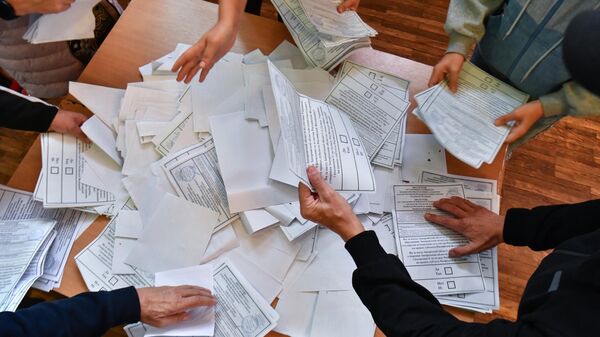
"On an instruction of the head of state, Aslan Georgiyevich Bzhaniya, we are closely monitoring the situation. We treat the position of people with attention and respect, this is their initiative, [the people] who live there, people who do not agree with the principles of policy-making in Ukraine, with in fact, clear and serious manifestations of neo-Nazi aspirations that are evident today in Ukraine. We consider this as people's disagreement with that policy," Ardzinba said.
When asked to comment on Secretary of State Antony Blinken's statement that the US does not object to Kiev using Western weapons to attack the DPR, LPR, the Zaporozhye and Kherson regions, Antonov said: "The sponsors of neo-Nazi criminals are approaching the dangerous line that Russia has repeatedly and clearly warned about. The United States becomes a party to the Ukrainian conflict."
"The referenda are over. The results are clear. Welcome home, to Russia!" Medvedev wrote on Telegram.
A total of 32,135 people have voted for the region's accession to the country, while 792 residents, or 2.38%, have opposed the idea.
Later in the day, the data, revealed after proceeding 100% of protocols, also showed that 98,69% of the Donetsk People's Republic (DPR) citizens, 97,93% of the Lugansk People's Republic (LPR) citizens and 97,81% of the Zaporozhye Region’s residents voting at Russian polling stations were in favor of their regions’ accession to Russia.
The international observers registered a high level of activity of citizens, their interest in participating in the referendum, and full understanding of the significance of their choice and its consequences. Participation in the referendum and voting were based on the free expression of citizens' will, no facts of coercion, pressure or bribery were observed.
Referendums were organized in accordance with generally accepted standards and were assessed by the observers as rather good. All conditions for free expression of the will of the citizens were created in accordance with the international principles and standards - universal, equal, direct right to participate in the referendum, secret ballot, openness and publicity of referendum procedures. Voting places were properly equipped and commissions received all necessary materials.
Voting was held in observation of the principles of openness and publicity - at all the polling stations there were people who observed the process - public and international observers, representatives of mass media.

